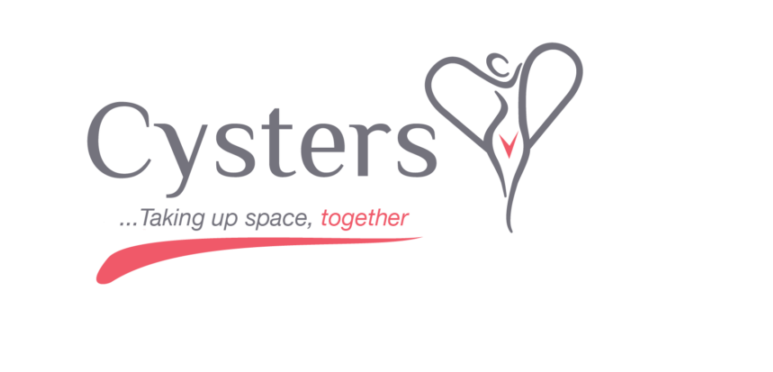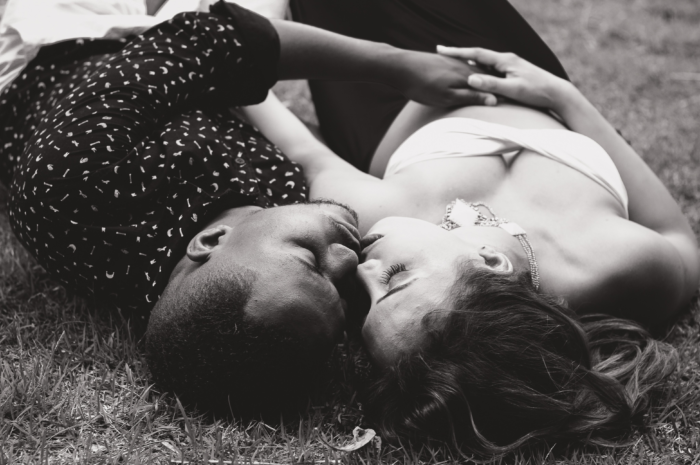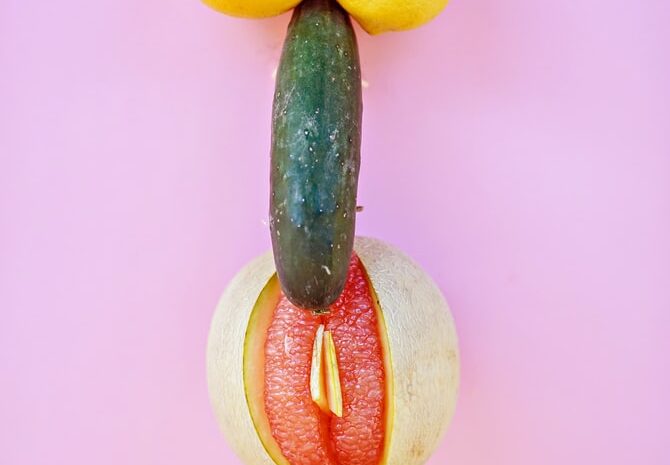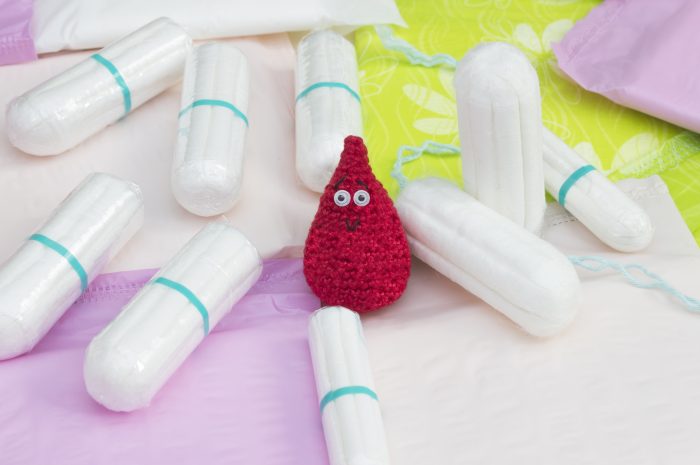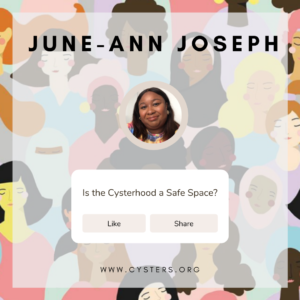
Is the Cysterhood a Safe Space?
by June-Ann Joseph (she/her)
*The Cysterhood referenced throughout this piece refers to the PCOS online community, and not the Cysters online community*
I started my period at the early age of 11 – since then, I have been struggling with both my period and the excruciating pains that happen a week or two before it arrives. Now, these aren’t your typical period pains. They are severe stabbing pains that would hit my ovaries and stop me in my tracks.
I kept it to myself for years. However, at the age of 17, I thought to myself, “I better go to the doctor and look into this”. The doctor explained that it was probably ovulation pain which is common, however just to be sure, she sent me for an internal ultrasound. When the ultrasound technician finished, he stated I was “all good”. I thought: great; I’m in the clear – only to receive a call from the doctor soon after asking me to come in to discuss my results. I was then diagnosed with PCOS.
Not understanding the full extent of PCOS and its effects on your mind and body meant I was in a constant battle with my health for 14 years. From heavy periods and passing out, blood clots the size of £2 coins or bigger, unbearable period pains that had me doubled over in bed for hours, to experiencing two episodes of chronic depression and ongoing anxiety.
Sadly, an incident occurred during work, where I leaked out of my tampon and onto my underwear and trousers (which luckily were black). I remember crying in the toilet and having to go home early. Since that day, I decided to take the initiative to look further into my diagnosis. To my surprise, I found a plethora of symptoms that I had been living with mentally and physically that were not my fault, but rather, they were a by-product of PCOS.
Since coming into the Cysterhood aka the PCOS online community, I’ve been welcomed, but the longer I continue to stay and contribute to this space (via my Instagram page and podcast), I’ve noticed that you need to build up resilience – especially when you’re a person of colour (POC). So I started my podcast and told my story to raise awareness about PCOS, especially amongst black women, because when I looked into the space, I rarely saw a person that looked like me. Especially when I looked at the podcasts available, I didn’t see anyone I could relate to. Most podcasts were about healthy eating, and truthfully I was tired of being told what I could and couldn’t eat, which saturates this space.
I’ve realised that the online reproductive health space is a breeding ground for services and businesses to message you and take advantage of your situation by pushing their agenda onto you. You have these “coaches” that sneak into your inbox to pretend they’re your friend when they want to try and sell you their diet and workout plan or recommend their business to other people. I’m just a random woman telling my story, hoping to raise awareness. I didn’t have an “I NEED HELP” sign on my forehead pleading for these businesses to enter my personal space, aka my DM’s.
As a Black British Caribbean woman, I love my food. I love my cultural food. Seeing that the community is oversaturated by a diet culture that doesn’t support my cultural background, especially the food I like to eat, makes it seem that the only people with PCOS are white people. Now don’t get me wrong, I know not all of my cultural delicacies are healthy, but some businesses and coaches make it sound like you enjoying that oxtail, rice, and plantain will end your existence. There is a lot of judgment, and many do’s, and don’ts can be considered toxic to people with PCOS, especially people of colour. So when you express that you’d like to enjoy your cultural food once in a while, you are deemed a bad example. Now we’re already prone to mental health issues with our hormones all over the place, but this judgemental culture could lead to eating disorders. A lack of research and information about PCOS creates a breeding ground for misinforming others about what helps and doesn’t help your systems (digestive, immunity etc.) and saying crazy things like giving up almond milk will help with your symptoms?!?!
There is also a sense of insufferable entitlement in knowing everything about PCOS and downplaying other people’s symptoms. E.g., I’ve been told that I may have Endometriosis because I expressed that I had really bad period pains. It’s dangerous for someone to enter my personal space and diagnose me, especially without any medical background or training. As a person of colour, I’m already being dismissed by my medical practitioner about my symptoms. We don’t all access the healthcare system in the same ways.
So is the Cysterhood a safe space? My opinion is yes and no.
I’ve built up the resilience to say NO or express disappointment when people push their agenda onto me, and I’m quite thankful for that. However, the Cysterhood also consists of people that have come together to share their experiences and personal journeys living with PCOS – and that is very much needed.

June-Ann was diagnosed with PCOS at the age of 17, and for 14 years she has been in a constant battle with her body. Following an incident that occurred during a heavy period, she decided to take the initiative to look further into her diagnosis. To her surprise, she found a plethora of symptoms she had been living with mentally and physically, were not her fault but rather, they were a by-product of PCOS. Described as a gynaecological problem with chances of infertility, she was unaware PCOS affected so much more than just that. Following this June-Ann has now made it her mantra to help raise awareness about PCOS via her podcast Black, Broke & Anxious.
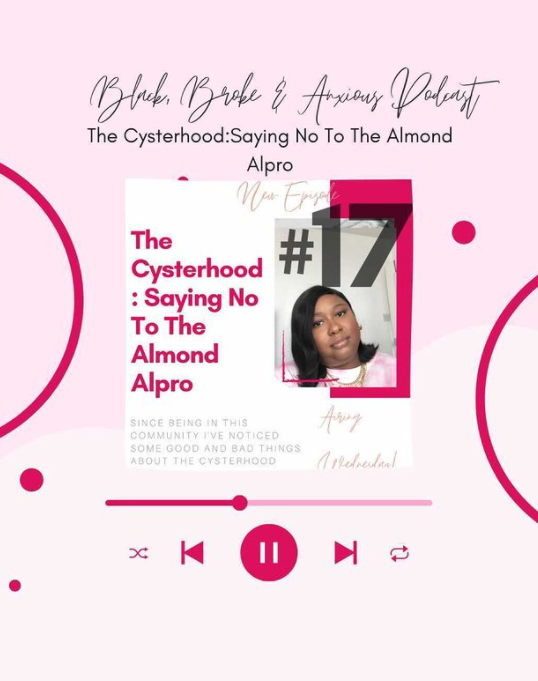
The Cysterhood: Saying No To The Almond Alpro:
“This episode is about the cysterhood and the good and the bad things about it. Now I’m not trying to come or anyone, in particular, every community has its good and its bad points and the cysterhood is no different. I’m sure you get from the joke in the title it’s all in jest, however, there are some serious, toxic traits that need to be called out. Love it or hate it but know it is the truth”.
Listen on SPOTIFY
Listen on APPLE PODCASTS
